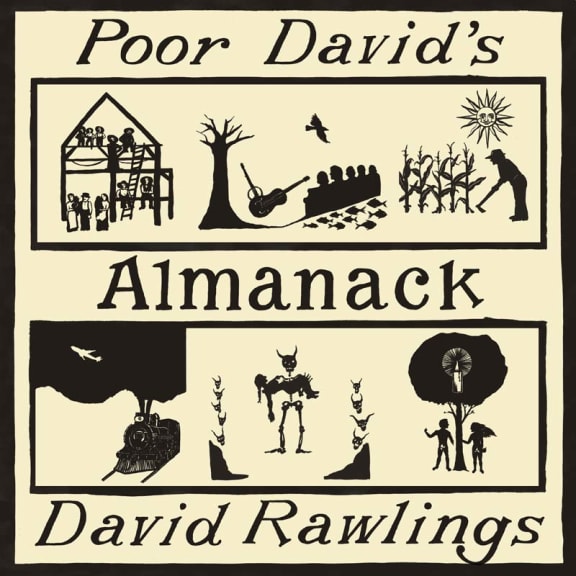Nick Bollinger discusses the hillbilly wisdom and folk traditionalism of David Rawlings

David Rawlings and Gillian Welch Photo: Henry Diltz
David Rawlings and Gillian Welch recently spent a hundred grand on a cutting lathe, so they could make the master copies for their vinyl LPs the old way, without going through any kind of digital process. Their songwriting, too, can give you a sense that there are things in the near-forgotten past that might seem arcane but are worth holding onto.

Poor David's Almanack Photo: supplied
The pair's latest album is credited solely to David Rawlings, yet like the five albums that bear Welch’s name, it is really the work of the two of them. ‘Money Is The Meat in the Coconut’, in which Rawlings sings lead and Welch harmonises while percussing with her hands and feet, is typical. The melody recalls any number of old American folk songs, as does the lyric, with its comic allegorical verses and chorus that offers an obscure piece of hillbilly wisdom.
The title phrase is actually one Rawlings made up himself. Yet the style of the song looks back to a time and place where authorship was fluid; where tunes and verses were mobile things that could be swapped and adapted to suit the needs of the singer.
But if the songs have the feel of folk artefacts, Rawlings and Welch don’t just sound as though they are trying to recreate a bygone age. In spite of the sepia tone of their work, they occasionally acknowledge more recent sounds. That’s particularly the case with the albums they have made under Rawlings’ name. On ‘Guitar Man’, you’ll find a rare example of Rawlings plugging in.
And on ‘Cumberland Gap’ they pay homage to Neil Young. The title comes from an old Appalachian folk ballad but Rawlings song is propelled by a distinctly Young-style chord sequence, while he and Welch slyly quote Young in the lyric.
American folk music is a continuum, all this mix-and-matching seems to say. It stretches from 19th century Appalachia through rock’n’roll and singer-songwriters, all the way to the present day.
That said, Poor David’s Almanack is more firmly planted in the past than some of Welch and Rawling’s records. The pair have referred to Welch’s Time (The Revelator) – an all-acoustic set from 2001 – as their ‘electric album' and in a weird way I know what they mean. It’s the album where the past and the present most convincingly inhabit the same space; where the sinking of Titanic, the assassination of Abraham Lincoln, and a touring punk band from Idaho can all appear in the same song at the same time. With just Welch and Rawlings’ voices and guitars the effect is somehow near-psychedelic.
Poor David’s Almanack is seldom as startling as that. If the chief difference between a Rawlings album and a Welch one is that on Welch’s records she sings lead while on Rawlings records he does, there is still an argument that Welch’s are the better records simply because she is the more persuasive lead singer. Yet with eight albums now between them, it’s clear that they are not following a conventional pattern of development from disc to disc. Rather, the music they make slides back and forth across time. In the best moments here it’s as if they’re not playing the song so much as the song is playing them.
Poor David’s Almanack is available on Acony

